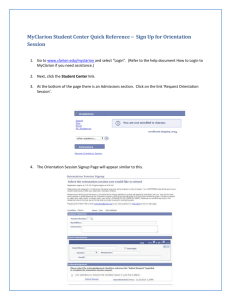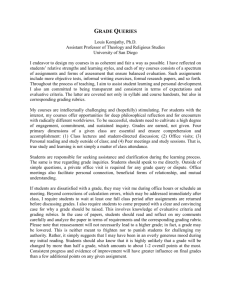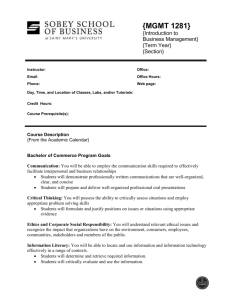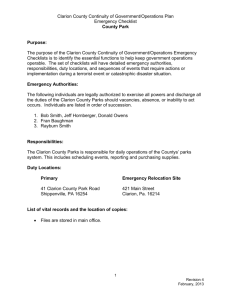Financial Problems - Savoir
advertisement
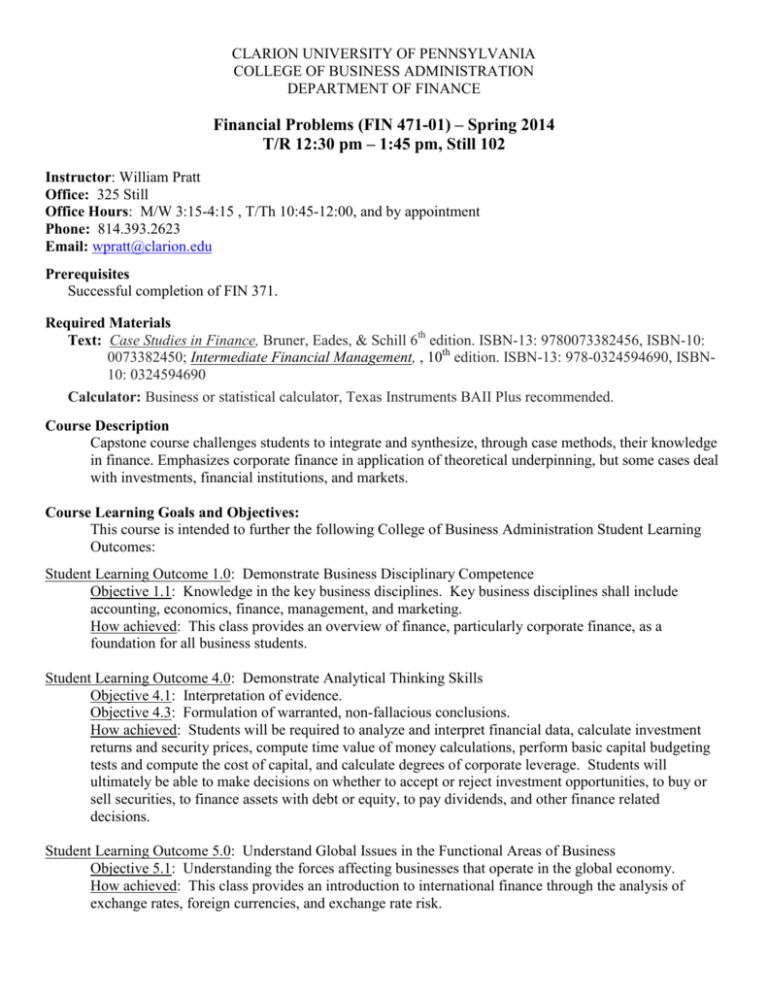
CLARION UNIVERSITY OF PENNSYLVANIA COLLEGE OF BUSINESS ADMINISTRATION DEPARTMENT OF FINANCE Financial Problems (FIN 471-01) – Spring 2014 T/R 12:30 pm – 1:45 pm, Still 102 Instructor: William Pratt Office: 325 Still Office Hours: M/W 3:15-4:15 , T/Th 10:45-12:00, and by appointment Phone: 814.393.2623 Email: wpratt@clarion.edu Prerequisites Successful completion of FIN 371. Required Materials Text: Case Studies in Finance, Bruner, Eades, & Schill 6th edition. ISBN-13: 9780073382456, ISBN-10: 0073382450; Intermediate Financial Management, , 10th edition. ISBN-13: 978-0324594690, ISBN10: 0324594690 Calculator: Business or statistical calculator, Texas Instruments BAII Plus recommended. Course Description Capstone course challenges students to integrate and synthesize, through case methods, their knowledge in finance. Emphasizes corporate finance in application of theoretical underpinning, but some cases deal with investments, financial institutions, and markets. Course Learning Goals and Objectives: This course is intended to further the following College of Business Administration Student Learning Outcomes: Student Learning Outcome 1.0: Demonstrate Business Disciplinary Competence Objective 1.1: Knowledge in the key business disciplines. Key business disciplines shall include accounting, economics, finance, management, and marketing. How achieved: This class provides an overview of finance, particularly corporate finance, as a foundation for all business students. Student Learning Outcome 4.0: Demonstrate Analytical Thinking Skills Objective 4.1: Interpretation of evidence. Objective 4.3: Formulation of warranted, non-fallacious conclusions. How achieved: Students will be required to analyze and interpret financial data, calculate investment returns and security prices, compute time value of money calculations, perform basic capital budgeting tests and compute the cost of capital, and calculate degrees of corporate leverage. Students will ultimately be able to make decisions on whether to accept or reject investment opportunities, to buy or sell securities, to finance assets with debt or equity, to pay dividends, and other finance related decisions. Student Learning Outcome 5.0: Understand Global Issues in the Functional Areas of Business Objective 5.1: Understanding the forces affecting businesses that operate in the global economy. How achieved: This class provides an introduction to international finance through the analysis of exchange rates, foreign currencies, and exchange rate risk. Student Learning Outcome 6.0: Demonstrate Effective Use of Technology and Data Analysis Objective 6.2: Understanding of and ability to use common methods of statistical inference. Objective 6.3: Understanding of data analysis and its use in business decision making. How achieved: Pursuant to their study of capital budgeting techniques, students will be required to calculate standard deviations and coefficients of variation when analyzing risk and utilize these results to refine their capital budgeting decisions. Exams There will be a final exam. No make-up exams will be given. Homework and Group Assignments Homework and group assignments will be assigned during the semester. The homework assignments will be due as posted on D2L by Friday of each week prior to the assignments due date. No late assignments will be accepted. Course Communication All important/official announcements will be posted on D2L. The Clarion University email system is considered an official means of communication and all students and employees are responsible for information sent to them via their Clarion account. I will not respond to any course-related email sent from any other email system. Grading: Final Exam Discussion Group Project Homework Total Points 150 200 300 350 1000 Letter grades will be determined as: 1000-900 (A) 899-800 (B) 799-700 (C) 699-600 (D) <600 (E) Attendance Class attendance is mandatory. Absence will result in a loss of 25 point. Notify the instructor of excused absence beforehand whenever possible. Student may refer to clarion.edu/956/#Class Attendance Policy Disability Support Services The Office of Disability Support Services is available to any enrolled Clarion University student having a documented disability. The Office of Disability Support Services provides student with reasonable accommodations as documented through evaluations. Appropriate accommodations are individually based upon identified need. The coordinator meets with these students each semester to determine the effectiveness of the accommodation and to evaluate the need for any further services. Students are solely responsible for contacting the DSS Office to request any accommodations or services. If you have a documented disability please immediately contact the Office of Disability Support Services, 102 Ralston Hall, DSS Coordinator Jill May (jmay@clarion.edu) 814-393-2095. Appropriate accommodations will be arranged. Student may refer to clarion.edu/1019/ . Academic Dishonesty Academic dishonesty will not be tolerated in this class. Cheating on examinations, inappropriate collaboration on projects, and other forms of dishonesty will be dealt with in a serious and formal manner. The minimum penalty for academic dishonesty in this class will be course failure. The student may also be liable for additional sanctions pursuant to University policy. Students should be familiar with the university policy on academic dishonesty as stated in the 2013-2015 Undergraduate Catalog. Student may refer to clarion.edu/956/ , and TurnItIn software detection policy: clarion.edu/40131/ . Important Information about Grading Near the end of each semester, one or a few students email to request special consideration for their grade because of special circumstances. I understand that everyone has a different situation regarding work and family obligations. However, the course requires the demonstration of knowledge, and the grading is completely based on the demonstration of knowledge of the course in the manner described in this syllabus. Extenuating circumstances of students such as a busy career, a busy personal life, needing a specific grade to graduate, needing a specific grade to continue receiving financial aid, needing a specific grade to transfer the credit to another university, or needing a specific grade to be taken off probation will NOT influence the grade that is given in this course. Whether a student pays in-state tuition, out-of-state tuition, or has a scholarship will NOT influence the grade that is given. The granting of grading favors to a student in this course would reflect discrimination against other students, and therefore is inappropriate. Your final grade will depend on your performance on assignments and exams in this course as explained in this syllabus. All students in this course are subject to the same guidelines, and the same grading scale. Therefore, students who presently have extenuating circumstances that make them believe they deserve special grading favors should not take this course. Since I have already explained my grading policy in this syllabus, I will not get involved in conversations via email (or other forms of communication) regarding special favors. It is not appropriate for me to grant special grading favors, and it is not appropriate for students to ask for special grading favors. I will not engage in discussions or respond to requests for preferential grading, so please do not send me such requests. After an exam some students who did not perform well ask if they can do extra work. This course is designed to assess a student’s understanding of specific material. Thus, a student needs to show evidence of understanding that material. I will not allow extra work for individual students, since that discriminates against others in the class who were not given the same opportunity. All the work that I require for the class is described at the beginning of the semester. So the key is that you do not put yourself in a situation in which you need extra credit. That is, use whatever time that might be applied toward extra work and apply that time to perform well on the required assignments and exams. If you dedicate your time doing the required work, you should not need to do extra work. There is normally a high correlation between the amount of time spent on required assignments and exam score. Classroom Conduct: - All cell phones must be turned off during class. No audible rings, no vibrating, nothing. - No text messaging during class. Texting during class is rude, and indicates disrespect for the instructor. Please refrain from texting while in this class. - Students are expected to remain in their seats for the duration of class. Please do all your stretching, talking, and restroom visits prior to class. I expect you to be present and paying attention throughout our entire class period. General Notes: 1. Attending class, and reading the text prior to class is required. 2. All exams may/will be closed book. 3. If you are late for an exam, no extra time will be allotted to you. 4. There will be no makeup exams or extra points assignments. 5. Cheaters will be prosecuted to the fullest extent. 6. You will be responsible for any material covered in class that is not in your text. 7. You should bring your text to class. 8. You are expected to be on time for class. This is especially important for exam dates. 9. Disruptive behavior in the classroom will not be tolerated. 10 “Extra-credit” and special considerations will not. Tentative Outline 01/20 – 01/24 01/27 – 01/31 02/03 – 02/07 02/10 – 02/14 02/17 – 02/21 02/24 – 02/28 03/03 – 03/07 03/10 – 03/14 03/17 – 03/21 03/24 – 03/28 03/31 – 04/04 04/07 – 04/11 04/14 – 04/18 04/21 – 04/25 04/28 – 05/02 05/05 05/06 – 05/09 Introduction, Review of World Com (ethics in finance) Case 44 Hershey Foods Case 1 Warren Buffett Case 4 The Battle for Value, FedEx versus UPS Case 12 Value Line Publishing Case 15 Teletech Corporation Case 17 & Case 19 Target Corp. Case 19 Target Corp. Continued Winter Holiday – No Class Held Case 25 Star River Electronics Case 25 Star River Electronics Continued Case 26 Gainesboro Machine Tool Corp. Case 34 Wrigley Co. Capital Structure Case 42 Arcadian Microarray Technologies Group case preparation Last Day of Classes “FINAL EXAM” Dates: March 14th – March 21th Drop Classes Withdrawal Classes January 21st – January 26th January 27th – March 28th Winter Holiday Drop Policy Students should not expect the instructor to accept the responsibility to drop or withdraw the student from the class. Any student desiring to drop the class must do so. All students on the official class roll will be given a grade at the end of the semester.



